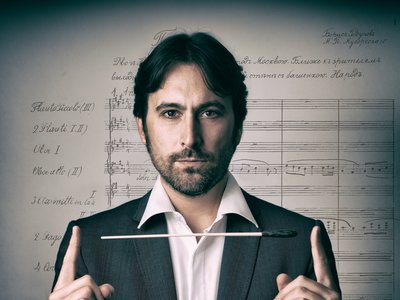Michelangelo Mazza, an Italian-Polish conductor, was born into a family of musicians and began his musical studies at a young age at the “A. Boito” Conservatory in Parma, where he attended the violin class. He later refined his skills at the “Stauffer Foundation” in Cremona under the guidance of maestro Salvatore Accardo. Already a successful soloist, at just over twenty years of age, he became the concertmaster of the Teatro Regio in Parma, collaborating with prestigious orchestras both in Italy and abroad. Parallel to his career as a violinist, he undertook conducting studies, which led him to be noticed by prominent figures such as John Neschling. The latter chose him as his permanent assistant during his tenure at the Teatro Municipal in São Paulo, offering him the opportunity to debut and hone his skills as a conductor with Verdi’s Falstaff.
After returning to Europe, he conducted a series of symphonic concerts at the Teatro Lirico in Cagliari, at the United Nations Assembly Hall in Geneva, and collaborated with important orchestras, conducting in prestigious festivals and theatres, including the Ljubljana Festival, the Bolshoi in Moscow, the Waldbühne in Berlin, the Alte Oper in Frankfurt, the Kölner Philharmonie, the Elbphilharmonie in Hamburg, the Festival Hall in Baden-Baden, and the KKL in Lucerne. He returned to São Paulo to conduct Manon Lescaut and Così fan tutte. In Italy, he also made a name for himself on the podium of the Teatro Massimo Bellini in Catania, conducting Rigoletto, and was later invited back for several symphonic concerts. At the Teatro Lirico in Cagliari, he conducted a production of La Bohème and a series of symphonic concerts dedicated to Beethoven. He also collaborated with the Orchestra Sinfonica di Milano. In Parma, he has frequently appeared in the program of the Teatro Regio: he conducted a lyric-symphonic concert as part of the Verdi Festival, Hamlet by Shostakovich as part of the Shakespeare Marathon, Fuoco di Gioia, and Aida for the Verdi Festival.
Other notable engagements in recent years include La Traviata at the Teatro Verdi in Trieste; Un Ballo in Maschera at the Budapest Opera, where he returned for a Gala with soprano Olga Peretyatko, at the Teatro Calderon in Valladolid, and at the Deutsche Oper in Berlin, where he had already made his debut with Cilea’s Adriana Lecouvreur; a concert at Lotte Hall in Seoul with soprano Sumi Jo for the inauguration of the Winter Olympic Games; a new production of I Vespri Siciliani at the Korea National Opera in Seoul; his North American debut at Roy Thomson Hall in Toronto; La Bohème at the Sydney Opera House, La Traviata with Anna Netrebko at the Wiener Konzerthaus, a concert with Anna Netrebko at the Teatro Massimo in Palermo, at the Teatro San Carlo in Naples, at the Teatro Real in Madrid, Tosca at the Teatro Colón in Buenos Aires; and collaborations with orchestras such as the Hong Kong Philharmonic and the Tokyo Philharmonic.
Recently, he conducted Turandot at the Wiesbaden Opera with Anna Netrebko in the title role during the Maifestspiele, La Bohème at the Torre del Lago Festival on the occasion of the Puccini Centenary, and a gala concert at the Macerata Opera Festival. He also served as the musical director of the first edition of the MOC Festival in Bucharest, conducting the festival’s main concerts with several international stars, including Anna Netrebko, Elina Garanča, Yusif Eyvazov, Roberto Alagna, Asmik Grigorian, and Nikolaj Szeps-Znaider.
